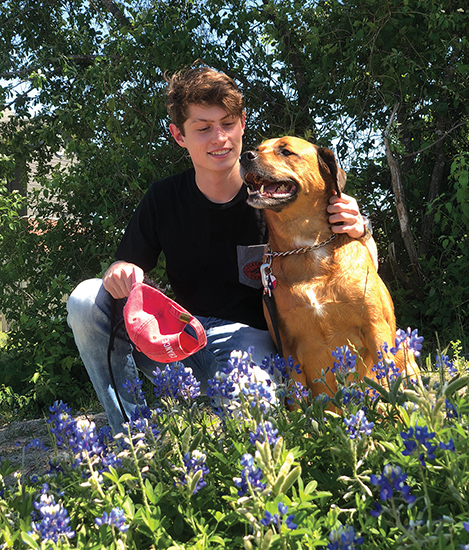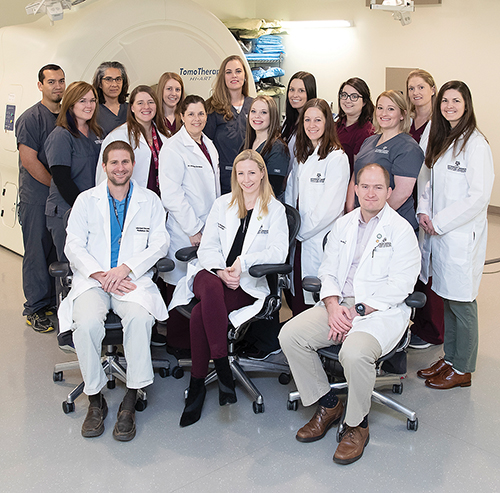Petco Foundation Grants: Supporting The Fight Against Cancer
Story by Dorian Martin
The Petco Foundation Pet Cancer Treatment grant at Texas A&M’s Veterinary Medical Teaching Hospital (VMTH) provides financial assistance to pet owners like Cannon Lenfield who have modest means or whose pets have provided a service to others.

Like most college students, Cannon Lenfield ‘20 didn’t have a lot of extra funds on hand when his 9-year-old dog, Liberty, was diagnosed with lymphoma in 2018. Yet the Texas A&M University student proved to be very resourceful in finding ways to pay for his dog’s treatment.
“At that point, I had just paid tuition and couldn’t afford to pay any more at the moment,” explained Lenfield, who didn’t have canine health insurance. “There was no way Liberty was going to be able to receive treatment any longer without help.”
A student worker in VMTH’s Small Animal Hospital Gastrointestinal Laboratory at the time, Lenfield paid for most of Liberty’s treatment on his own, which required him to buckle down financially.
“I definitely couldn’t buy a lot of stupid things anymore; I stopped eating out and stuff like that,” he said. “I knew that it was going to take a lot of money to pay for it so I doubled my hours.”
Lenfield was so committed to ensuring Liberty’s care that after being in a motorcycle accident, he reallocated an insurance payment to help pay the bill.
“My bike still worked so I didn’t need the money,” he said. “I was fine.”
Fortunately, Texas A&M’s Veterinary Medical Teaching Hospital (VMTH) was able to step in to offer him support through the Petco Foundation Pet Cancer Treatment grant, which was established in early 2019. This grant provides financial assistance to pet owners who have modest means or whose pets have provided a service to others.
The timing of receiving these funds was especially helpful in Liberty’s case.
A Friend For Life
Lenfield was a boy when his family adopted the mixed-breed puppy from a kill shelter. They decided to name the dog Liberty because she was scheduled to be euthanized on Sept. 11 but was rescued on Sept. 10.
The young boy and pup quickly formed a tight bond and grew even closer in the ensuing years. Lenfield opted to bring her to college with him so he could spend time with her between his classes and studies.

“She was definitely my best friend,” he said.
When the dog reached the age of 9, she started displaying signs of ill health.
“While I was on vacation, the dog sitter noticed a lump on both sides of her neck, in her lymph nodes,” the public health graduate said. “I took her to the veterinarian the day that I got back and they told me that she probably had cancer.”
Lenfield immediately turned to the VMTH’s oncology staff—who confirmed the diagnosis—to oversee Liberty’s treatment.
“Obviously, they were going to be the best help that I could get,” he said. “Plus, there’s no one else in the area that offers treatment for lymphoma.”
The Best Treatment For A Best Friend
After deciding to pursue treatment at the VMTH, Lenfield found that that care wasn’t cheap.
“We use a lot of the human-level drugs and equipment, but we don’t have insurance to help support that,” said Dr. Heather Wilson-Robles, an associate professor and Dr. Fred A. and Vola N. Palmer Chair in Comparative Oncology. “We keep our prices as low as we can, but unfortunately, it’s still expensive.”
Liberty initially qualified for a study that helped cover a portion of the initial treatment cost.
“That helped pay for a portion of the costs and then after that, anything additional was on me,” Lenfield said. “I got the Petco funds later, but in between there and then it was all me.”
The VMTH’s staff was excited to be able to offer Lenfield the funds because they were so impressed by his commitment to Liberty.

“He was trying so hard to do everything for this dog. We had sort of piecemealed treatments for him as much as we could—we put her on any studies we could and looked for anything we could do to help him pay for things,” said Wilson-Robles. “Finally, we got to a point where we didn’t have any studies she qualified for and he just wasn’t sure he could afford treatment, so we offered him the Petco funds. He just started sobbing because he was just so grateful because he didn’t have to stop. This dog was his family. He didn’t have any other family in town.”
“I didn’t think happy tears were real until I got the financial assistance to care for Liberty, Lenfield said.
Worth Every Penny
Sadly, despite her treatments, Liberty succumbed to her lymphoma in September 2019, but throughout it all, Lenfield had no doubt that the VMTH veterinary staff was focused on providing Liberty the best care possible.
“I can’t say enough how awesome these people are,” Lenfield said. “They truly are a wonderful group of people and there’s no one else in the world I would’ve rather treated my dog. They are some of the most caring, compassionate and knowledgeable people this world has to offer and will do everything in their power to take care of you and your animal.”
Lenfield said given the chance, he would take the same course of action all over again.
“If you have the money, you should definitely spend it. She was there for me for eight years and I only had to do it for one year. Up until then I only fed her,” he said. “I would never take any of the money back. I spent like $1,500 in the last week she was alive and even that week was worth $1,500.”
###
Note: A version of this story originally appeared in the Spring 2020 edition of CVM Today.
For more information about the Texas A&M College of Veterinary Medicine & Biomedical Sciences, please visit our website at vetmed.tamu.edu or join us on Facebook, Instagram, and Twitter.
Contact Information: Jennifer Gauntt, Director of Communications, Texas A&M College of Veterinary Medicine & Biomedical Sciences; jgauntt@cvm.tamu.edu; 979-862-4216


